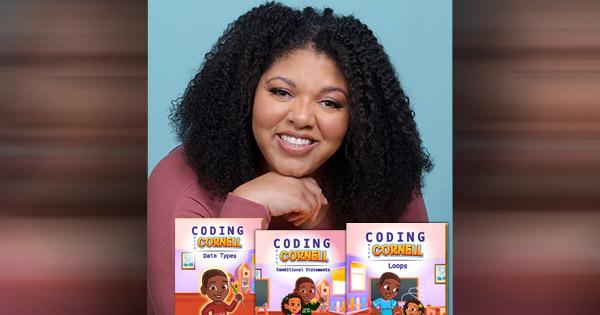Software Engineer Releases Coding Book Series for Kids and Beginner Book for Adult Learners
Software Engineer and Coding Instructor Ronesha D. Dennis has released a four-book coding series for children titled Coding with Cornell and a beginner coding book for adult learners titled, Python, the Relatable Way: For the Future Coder Who’s Never Written a Line of Code.
Ronesha, who always displayed an interest in coding as a child, feared committing to the software engineering field and instead started her career in public health after graduating from Howard University in 2011. A crossroads came five years into working professionally, causing the then-Partnerships Manager to pivot into software engineering after participating in a coding boot camp and a coding fellowship.
After teaching with youth-focused programs such as Black Girls Code in Chicago in 2017, and D.C. and Virginia-based coding programs for young learners and teens, Ronesha secured a position where she eventually grew into a Lead Engineer at a Virginia-based KM consultancy firm, leading multi-million dollar projects and talented teams of engineers; however, her passion always remained in increasing access to STEM for children and young adults, and especially members of minority communities.
From these experiences came the desire to write the Coding with Cornell series, which centers on a seven-year-old black boy named Cornell, teaching his two-year-old sister Cori how to code using Python, one of the most in-demand coding languages of today.
“When I taught with the D.C. and Virginia-based program, what I noticed was that the youngest groups of learners came from families that had the financial resources to expose their children to STEM early. Classes could be upwards of $5,000 for eight weeks,” the author expressed.
“Many of the youngest learners, children between the ages of 5 and 9, did not look like Cornell or Cori. When I taught groups of teens and young adults who could’ve been older siblings to characters like Cornell and Cori, they were often learning the foundations of coding for the first time. Of course, they excelled, and I’m outrageously proud of them, but I often wonder what would have happened if they were afforded the opportunity of early exposure.”
That early exposure is what Ronesha hopes to provide with the “Coding with Cornell” series. Each book in the series, recommended for readers aged 3-8+, covers one foundational topic. The four books in the series are Coding with Cornell: Data Types, Coding with Cornell: Conditional Statements, Coding with Cornell: Lists, and Coding with Cornell: Loops.
“The Coding with Cornell series will grow in many ways,” said Ronesha. “These first four books not only introduce the coding concepts, but they also provide examples that black kids and parents can relate to, all while using rhyme to make the concepts memorable. When families read these books, I want children to see themselves and I want them to gain knowledge of an incredibly marketable skill.”
Ronesha encourages families to read the Coding with Cornell series together. Parents and older readers who enjoy the book can continue their learning with “Python, the Relatable Way: For the Future Coder Who’s Never Written a Line of Code.”
“I always knew I wanted to write a coding book for adult learners because when I participated in coding boot camps, I saw how much my peers struggled,” Ronesha said. “I was fortunate to have had early exposure to coding, but when you don’t have that, truly grasping the concepts can feel even more difficult.”
Python, the Relatable Way: For the Future Coder Who’s Never Written a Line of Code<?i> introduces many of Python’s foundational concepts, such as data types, data structures, control structures, functions, classes, and modules. The book culminates with a project that allows readers to test their knowledge of each new concept. What differentiates “Python, the Relatable Way” from other coding resources is that the author provides pre-chapter “Zoom Outs” that convey personal stories of how she was able to grasp these concepts.
“I want to take away the feeling of being overwhelmed the first time a person writes code, especially because older learners can sometimes be harder on themselves,” the author says of her reasoning for writing the book for adult learners. “Being a software engineer and truly diving into the field is an ever-learning, ever-growing process, but you have to start at the beginning, and you’ll build confidence over time.”
The author hopes the pairing of her books creates a new path for families.
“The greatest gift for me would be seeing families reading together and creating a new pathway. Imagine working together—teaching your children how to code while you’re learning the basics and turning that into a new career. I don’t know if that will happen for a family, but if it could for just one family, I will have done my job.”
The Coding with Cornell series and Python, the Relatable Way are available now on Amazon and will become available on other platforms soon.
Readers can learn more about each book at BergeronWoodley.com/books and review a snippet of Coding with Cornell: Data Types at CodingWithCornell.com
For press inquiries, contact press@bergeronwoodley.com.



